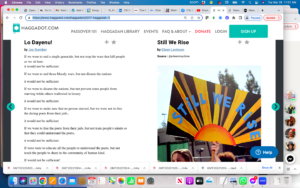Enough Bothsidesism Already!
Bothsidesim, as you might have guessed, is the mainstream media’s tendency to pretend that reporting objectively requires covering “both sides” with equal weight. But here are a few problems with that approach:
- Often, there are many more than two sides. Bothsidesism pushes other voices and more nuanced analysis to the margins, just as the two-party system that drives most US politics. Not everything can be separated into either/or, black/white, environmentally friendly/environmentally harmful. A great example would be US Supreme Court decisions in the 1970s, where Justices would frequently write concurring opinions that raised issues and perspectives outside the “official” opinion (this is less true of the current court, which disposes of many cases in the “shadow docket“).
- When there are just two sides, one side may be well-reasoned and make a compelling case, while the other puts forth “alternative facts“–in other words, lies–to build a case based on demagoguery or deceit. (The link goes to an NBC clip of then presidential advisor Kellyanne Conway, 2 minutes in, introducing the term in an interview early in the term of the 45th US president–and the interviewer, Chuck Todd, calling her out immediately.)
- Bothsidesim turns any contest of ideas into a “horse race” where the issues get swept aside in favor of who appears to be the better debater.
The current “debate” over DT’s federal indictment in the document-hiding case shows what happens when bothsidesim runs amok–and this is NOT about Republican vs. Democrat. While some media fall all over themselves to cry, “both sides did this,” quoting hyperpartisan pols like Ted Cruz, there is a lot of similarity between the approaches of Republican former VP Mike Pence and Democratic former VP (now president) Joe Biden, and basically none between either of them and DT.
What differentiates the cases of Pence and Biden from DT’s is simple: The two former VPs immediately notified government agencies and cooperated fully, while DT reportedly was personally involved in hiding documents and telling the government there were no more. It took Pence’s team just three days to turn over the documents; Biden’s response was even quicker, and the documents were delivered one day after discovery.
DT falsely claimed all the documents had already been turned in and stalled so long that the government sent in the FBI to retrieve them. Also, DT’s document trove reportedly includes important military secrets, and DT showed these to people who were not authorized to see them–potentially putting our country and its military at risk.
It’s interesting that some of the most sycophantic yes-men of the DT years–not just Pence but also former Attorney General William Barr and former National Security Advisor John Bolton–have broken with DT over his handling of the matter.
The astute historian Heather Cox Richardson provides an equally current example thousands of miles outside the US. She quotes Timothy Snyder, a Yale scholar of authoritarianism on the recent Russian attack on Ukraine’s Nova Kakhovka Dam:
Snyder warned journalists not to “bothsides” the story by offering equal time to both sides. “What Russian spokespersons have said has almost always been untrue, whereas what Ukrainian spokespersons have said has largely been reliable. The juxtaposition suggests a false equality,” he wrote. “The story doesn’t start at the moment the dam explodes. For the last fifteen months Russia has been killing Ukrainian civilians and destroying Ukrainian civilian infrastructure, whereas Ukraine has been trying to protect its people and the structures that keep them alive.” “Objectivity does not mean treating an event as a coin flip between two public statements,” he said. “It demands thinking about the objects and the settings that readers require for understanding amidst uncertainty.”
Let’s hope that becomes the mantra for journalists everywhere.



 Check out this
Check out this 


